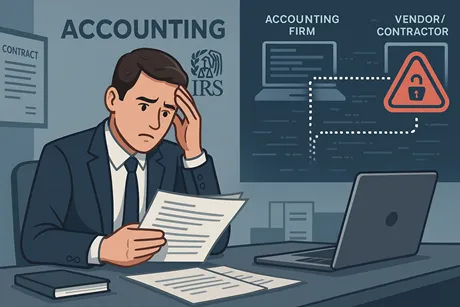
Vendor Vulnerability: Why Your Accounting Firm Might Be Liable for Someone Else's Breach
Vendor Vulnerability: Why Your Accounting Firm Might Be Liable for Someone Else's Breach
They Got Hacked. Why Are You Liable?
Picture this scenario: You've invested in robust cybersecurity measures for your accounting firm. Your systems are secure, your staff is trained, and you've implemented the IRS Written Information Security Plan (WISP) requirements. Then the unthinkable happens – one of your contractors experiences a data breach, exposing your clients' sensitive financial information.
The contractor got hacked. But guess who clients and regulators might hold responsible? Your firm.
The Hidden Danger in Your Business Relationships
Small and mid-size accounting firms don't operate in isolation. You rely on software providers, IT contractors, cloud services, and other vendors who have varying levels of access to your clients' sensitive tax and financial data.
When these third parties fail to maintain adequate security measures, they create a backdoor to your clients' information – and potentially create significant liability for your firm.
How Your Firm Becomes Liable for Others' Mistakes
The IRS has made it clear: tax professionals are required by law to secure client data. The recently updated Publication 5708 Written Information Security Plan (WISP) specifically addresses vendor management as a critical component of your security responsibility.
Here's how liability shifts to your firm:
Contractual Blind Spots: Many standard vendor contracts include liability caps (sometimes as low as $10,000) and indemnification clauses that shift breach costs to you.
Regulatory Requirements: Under FTC requirements referenced in the WISP, your firm must "select service providers that can maintain appropriate safeguards" and ensure contracts require them to maintain those safeguards.
Notification Burden: If a vendor exposes your clients' data, you – not the vendor – may be legally required to handle all customer notifications and regulatory reporting within strict timeframes.
Real-World Impact on Accounting Firms
For a small or mid-size accounting firm, the consequences can be devastating:
The average cost of a data breach now exceeds $4.5 million
Regulatory fines from the IRS, FTC, and state agencies
Mandatory notification to affected clients (potentially damaging client relationships)
Required reporting to the IRS Stakeholder Liaison, state tax authorities, and the FTC within 30 days
Reputational damage in a trust-based business
Protection Starts with Your Written Information Security Plan
The updated IRS WISP template provides a framework for protecting your firm from vendor vulnerabilities. Key elements include:
Vendor Assessment: Establish procedures to vet vendors before sharing access to sensitive data
Contractual Protections: Implement stronger contracts that hold vendors accountable
Access Limitation: Restrict vendor access to only the data necessary for their specific function
Ongoing Monitoring: Regularly review vendor compliance with security requirements
Actionable Steps to Protect Your Accounting Firm
Review Existing Contracts: Examine vendor agreements for unfavorable liability terms and renegotiate where possible to ensure adequate protection.
Implement Role-Based Access: Restrict contractors' access to client data based on specific job functions, not blanket permissions.
Conduct Vendor Security Assessments: Before engaging new vendors, verify their security practices align with your WISP requirements.
Establish a Vendor Management Program: Create a formal process for regular monitoring of vendor security compliance.
Develop Incident Response Plans: Include vendor breach scenarios in your data breach response planning.
How WISPnest Can Help
At WISPnest, we understand the unique challenges accounting firms face in managing vendor relationships and meeting IRS requirements. Our Complete WISP Solution provides comprehensive protection against vendor vulnerabilities:
Customized vendor management policies and procedures
Contract templates with appropriate security and liability provisions
Training for both employees and contractors on security best practices
Vendor assessment tools to evaluate third-party security
Ongoing monitoring and compliance verification
Don't let a vendor's security weakness become your liability. Contact WISPnest today to learn how our Complete WISP Solution can help protect your accounting firm from third-party security risks.
Conclusion
Every vendor relationship is a cybersecurity decision. When you don't actively manage where liability falls, it typically lands on your firm by default. The IRS WISP requirements make it clear that accounting firms bear responsibility for protecting client data – even when working with third parties.
By implementing strong vendor management practices as part of your WISP, you can significantly reduce the risk of being held liable for someone else's security failure.